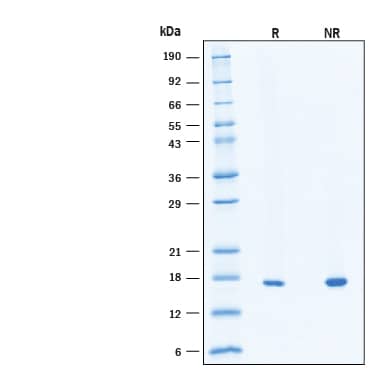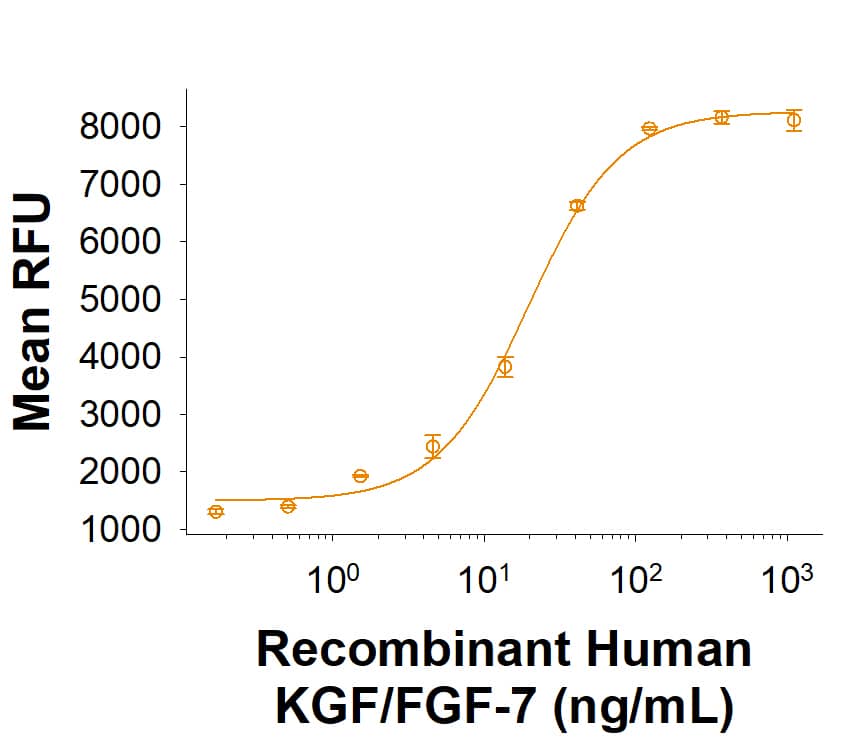Recombinant Human KGF/FGF-7 Protein, CF
R&D Systems, part of Bio-Techne | Catalog # 11537-KG
CHO expressed

Key Product Details
Product Specifications
Source
Chinese Hamster Ovary cell line, CHO-derived human KGF/FGF-7 protein
Ser55-Thr194
Ser55-Thr194
Purity
>95%, by SDS-PAGE visualized with Silver Staining and quantitative densitometry by Coomassie® Blue Staining.
Endotoxin Level
<0.10 EU per 1 μg of the protein by the LAL method.
N-terminal Sequence Analysis
Ser55
Predicted Molecular Mass
16 kDa
SDS-PAGE
15-18 kDa, under reducing conditions
Activity
Measured in a cell proliferation assay using Ba/F3 mouse pro B cells transfected with human FGF RIIb. The ED50 for this effect is 4.00-40.0 ng/mL.
Scientific Data Images for Recombinant Human KGF/FGF-7 Protein, CF
Recombinant Human KGF/FGF‑7 Protein Bioactivity.
Measured in a cell proliferation assay using Ba/F3 mouse pro B cells transfected with human FGF RIIb. The ED50 for this effect is 4.00-40.0 ng/mL.Recombinant Human KGF/FGF‑7 Protein SDS-PAGE.
2 μg/lane of Recombinant Human KGF/FGF‑7 Protein (Catalog # 11537-KG) was resolved with SDS-PAGE under reducing (R) and non-reducing (NR) conditions and visualized by Coomassie® Blue staining, showing bands at 15-18 kDa, under reducing conditions.Formulation, Preparation and Storage
11537-KG
| Formulation | Lyophilized from a 0.2 μm filtered solution in MOPS, Na2SO4 and EDTA with Trehalose. |
| Reconstitution | Reconstitute 10 μg size at 100 μg/mL and the other sizes at 200 μg/mL in PBS. |
| Shipping | The product is shipped at ambient temperature. Upon receipt, store it immediately at the temperature recommended below. |
| Stability & Storage | Use a manual defrost freezer and avoid repeated freeze-thaw cycles.
|
Background: KGF/FGF-7
References
- Mohammadi, M. et al. (2005) Cytokine Growth Factor Rev. 16:107.
- Itoh, N. and D.M. Ornitz (2008) Dev. Dyn. 237:18.
- Vadija, R. et al. (2016) J. Chem. Biol. 9:69.
- Itoh, N. and D.M. Ornitz (2004). Trends Genet. 20:563.
- Steiling, H. and S. Werner (2003) Curr. Opin. Biotechnol. 14:533.
- Geer, D.J. et al. (2005) Am. J. Pathol. 167:1575.
- Qiao, J. et al. (1999) Development 126:547.
- Zhang, X. et al. (2023) Life Sci. 326:121804.
- Hsu, E. et al. (2006) PEDS 19:147.
- Sadeghi, S. et al. (2021) Int. J. Biol. Macromol. 191:1175.
Long Name
Keratinocyte Growth Factor
Alternate Names
FGF-7, FGF7, HBGF-7, HBGF7
Gene Symbol
FGF7
UniProt
Additional KGF/FGF-7 Products
Product Documents for Recombinant Human KGF/FGF-7 Protein, CF
Product Specific Notices for Recombinant Human KGF/FGF-7 Protein, CF
For research use only
